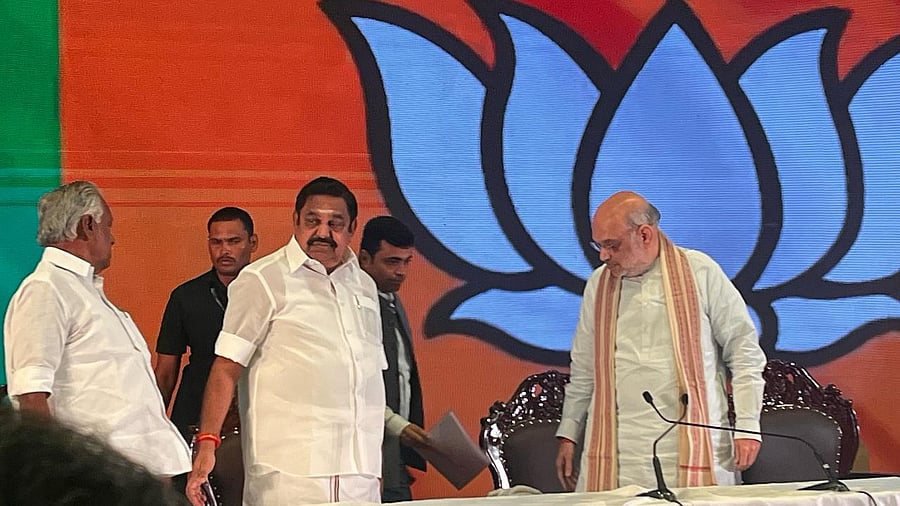
Amit Shah with Edappadi K Palaniswami (centre).
Credit: ETB Sivapriyan
Chennai: “The DMK continues to claim that the AIADMK will share power with the BJP if we form the government. Mr (M K) Stalin, let me tell you, we are not fools. The AIADMK will form a government on its own. Being in an alliance or not is our decision,” AIADMK general secretary Edappadi K Palaniswami declared recently in one of his campaign speeches.
Though the above statement appears aimed at the DMK and its persistent narrative that Tamil Nadu would be headed for a coalition era if the NDA were to come to power, it is also seen as a warning to the BJP not to push for power-sharing in a state where the party currently has little stake.
The strong words from Palaniswami -- who seems visibly vexed at the BJP’s repeated assertions about a coalition government in a state traditionally governed by single-party dispensations -- raise a pertinent question: will this alliance, stitched together with the sole aim of unseating the DMK, remain smooth until the elections, which are eight months away?
The two parties joined together in April 2025 after a messy separation in September 2023, but the Lok Sabha election results -- where both failed to win seats -- prompted them to come together. It is an open secret that a sizable chunk of the AIADMK cadres do not cherish the party’s alliance with the BJP, which they feel has alienated the party from many sections, including minorities.
While the state BJP, now led by former AIADMK member Nainar Nagendran, was quick to clarify that Palaniswami’s remarks carried no “ulterior motive,” the contradiction over the prospective composition of the government remains a thorn in the relationship between the two parties.
A section of the BJP continues to harbor doubts about Palaniswami’s reliability, especially as he appears to contradict BJP’s master strategist Amit Shah, who has made it clear that the BJP expects to be part of the government if the alliance comes to power.
Even if one assumes that both Palaniswami and Shah are sticking to their respective stands to cater to their own cadres, the constant debate around whether it will be a coalition or a single-party government might be self-destructive, political analysts warn.
The alliance has not won either of the two elections it has contested together -- 2019 Lok Sabha polls and 2021 assembly elections -- with lack of cohesiveness between the AIADMK and the BJP often cited as one of the principal reasons.
Prof Ramu Manivannan, who taught political science at the University of Madras, told DH that the lack of will or trust between the two parties will have “serious repercussions” for the alliance in the assembly polls, as the differences between the two parties are irreconcilable.
“Such problems were expected as the AIADMK was dragged into the alliance against its own will by the BJP, which didn’t want to contest alone.”
But the BJP’s real intention, Manivannan added, is to increase its lung power in the legislative assembly and become a significant player in Tamil Nadu, he said.
He further added that breaking ties with BJP wasn’t an option for the AIADMK since it is aware that hurdles can be created for Palaniswami in the form of dusting up the Two Leaves symbol case before the Election Commission of India and other corruption cases against its leaders.
“By being with the BJP, EPS can keep all these things under wraps. Both parties have to survive, and this necessity might keep them together despite differences, but that won’t help either,” Manivannan said.